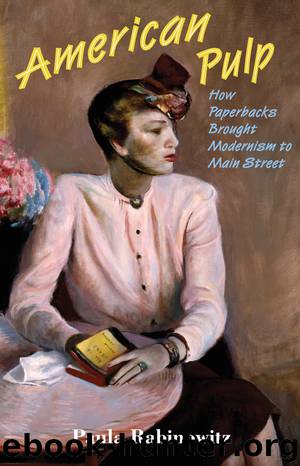American Pulp by Rabinowitz Paula

Author:Rabinowitz, Paula
Language: eng
Format: epub
Publisher: Princeton University Press
Published: 2014-04-07T04:00:00+00:00
CHAPTER 8
Sci-Unfi: Bombs, Ovens, Delinquents, and More
Pulps were essentially products of the Second World War. Allen Lane had launched Penguin in 1935 and then, in 1939, Ian Ballantine brought Penguin to the United States for its American branch. But it was also “stolen,” as E. L. Doctorow recounted, by Robert de Graff and turned into an American product, reviving the paperbound book in the United States with Pocket Books and its kangaroo logo. During the war, the Council on Books in Wartime had joined with the army and navy to develop and deliver more than one hundred forty million paperback books to overseas servicemen and women, chosen relevant books for promotion, and inaugurated a program to distribute translations of American books to occupied nations. While the original impetus for the pocket book was as a cheap and pervasive reprint format for works of fiction, nonfiction quickly became part of publishers’ lines. (Penguin differentiated genres by the color of the cover.) Nonfiction became important during World War II as citizens followed battle reports—and so needed an education in geography, political history, and technologies of warfare. With the advent of the Cold War and the nuclear age after the defeat of Germany and Japan, the interest in the global scope of threats meant a market for science writing, biography, and history, as well as the newer social sciences of economics, psychology, and sociology. Thus, World War II literally facilitated the spread of pulp, but the aftereffects of war’s horrors—extermination camps, atomic bombings, and the Cold War—globalized terror in surprising ways. Pulp crystallized these sites of anxiety, paradoxically domesticating them as homegrown disturbances. Truth also got pulped.
Cloaking is essential to pulp, even though the aim of pulp paperbacks was to spread knowledge—good reading for the millions—by being seen. These books were made to seem as if they held secrets about women’s sexuality, nuclear war, interracial sex, and the Holocaust that could be discerned as much by scrutinizing the covers as by reading between them. Take the 1948 first US paperback edition of John Hersey’s report on Hiroshima. First published in the New Yorker to sensational acclaim, Alfred Knopf brought Hiroshima out in hardback while Penguin issued it in the United Kingdom almost immediately, each with a discreet, subdued cover mirroring the clipped, straightforward prose Hersey devised to relay the story of six survivors. However, in the United States, it was paperbacked as pulpy Bantam Book No. 404 with a cover depicting an average American couple fleeing an urban holocaust as an explosion appears, blotting the horizon—an image revived by Donald Siegel in his film Invasion of the Body Snatchers (1956) but found already on the 1955 Jack Finney novel, The Body Snatchers, as a Dell paperback with a cover by Jack McDermott. Thus, the story of America’s destruction of a Japanese city, told in restrained prose through the accounts of six survivors and eyewitnesses, had transmogrified into a garish nightmare of American annihilation—presumably, given the title, by the Japanese. Inside, before the copyright page, is a note about the cover and its author.
Download
This site does not store any files on its server. We only index and link to content provided by other sites. Please contact the content providers to delete copyright contents if any and email us, we'll remove relevant links or contents immediately.
4 3 2 1: A Novel by Paul Auster(12354)
The handmaid's tale by Margaret Atwood(7729)
Giovanni's Room by James Baldwin(7301)
Asking the Right Questions: A Guide to Critical Thinking by M. Neil Browne & Stuart M. Keeley(5741)
Big Magic: Creative Living Beyond Fear by Elizabeth Gilbert(5726)
Ego Is the Enemy by Ryan Holiday(5392)
The Body: A Guide for Occupants by Bill Bryson(5065)
On Writing A Memoir of the Craft by Stephen King(4920)
Ken Follett - World without end by Ken Follett(4706)
Adulting by Kelly Williams Brown(4552)
Bluets by Maggie Nelson(4534)
Eat That Frog! by Brian Tracy(4500)
Guilty Pleasures by Laurell K Hamilton(4425)
The Poetry of Pablo Neruda by Pablo Neruda(4079)
Alive: The Story of the Andes Survivors by Piers Paul Read(4010)
White Noise - A Novel by Don DeLillo(3990)
Fingerprints of the Gods by Graham Hancock(3979)
The Book of Joy by Dalai Lama(3961)
The Bookshop by Penelope Fitzgerald(3827)
